

Nelson Mandela. Mandela was arrested in 1962 and sentenced to five years in prison.
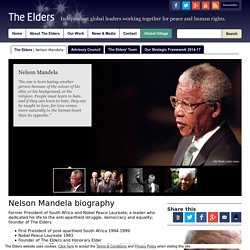
While in prison he was also charged with plotting to overthrow the government by violence. During the Rivonia trial, as it came to be known, Mandela made one of his most famous statements: “I have fought against white domination, and I have fought against black domination. I have cherished the ideal of a democratic and free society in which all persons live together in harmony and with equal opportunities. It is an ideal which I hope to live for and to achieve. In 1964 Mandela was sentenced to life imprisonment and incarcerated on Robben Island. Nelson Rolihlahla Mandela. Contents Childhood and education (1918-1930s) An African Nationalist comes of age (1940s) 'Volunteer in chief'- A decade of defiance (1950s) Prisoner for Life (1964-1990) Free at last - negotiations to presidency (1994-1999) Mandela in retirement (1999 - 2013) Nelson Mandela Awards 1960s - 2000s Awards 1980s Awards 1990s Awards 2000s In November 2009, the United Nations General Assembly declared, 18 July Nelson Mandela International Day, to honour his birthday.
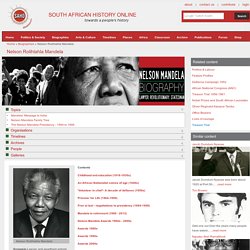
The UN has also asked the people of the world to set aside 67 minutes of their day to undertake a task that would contribute to bringing joy or relief to the millions of disadvantaged and vulnerable people of the world. Mandela’s fame rests on his role as a revolutionary leader who spent nearly seven decades of his life in the struggle against white minority rule and for a free and democratic non-racial society. Nelson Mandela, South Africa’s Liberator as Prisoner and President, Dies at 95. Nelson Mandela - Civil Rights Activist, President (non-U.S.), Writer. Nelson Mandela became the first black president of South Africa in 1994, serving until 1999.
A symbol of global peacemaking, he won the Nobel Peace Prize in 1993. Synopsis Nelson Mandela was born on July 18, 1918, in Mvezo, Transkei, South Africa. Becoming actively involved in the anti-apartheid movement in his 20s, Mandela joined the African National Congress in 1942. For 20 years, he directed a campaign of peaceful, nonviolent defiance against the South African government and its racist policies.
Early Life. Biography – Nelson Mandela Foundation. Rolihlahla Mandela was born into the Madiba clan in the village of Mvezo, in the Eastern Cape, on 18 July 1918. His mother was Nonqaphi Nosekeni and his father was Nkosi Mphakanyiswa Gadla Mandela, principal counsellor to the Acting King of the Thembu people, Jongintaba Dalindyebo. In 1930, when he was 12 years old, his father died and the young Rolihlahla became a ward of Jongintaba at the Great Place in Mqhekezweni1. Hearing the elders’ stories of his ancestors’ valour during the wars of resistance, he dreamed also of making his own contribution to the freedom struggle of his people.
He attended primary school in Qunu where his teacher, Miss Mdingane, gave him the name Nelson, in accordance with the custom of giving all schoolchildren “Christian” names. He completed his Junior Certificate at Clarkebury Boarding Institute and went on to Healdtown, a Wesleyan secondary school of some repute, where he matriculated. Document 11: Second letter from Nelson Mandela to Hendrik Verwoerd, 26 June 1961 - The O'Malley Archives. I REFER YOU TO MY LETTER of 20 April 1961, to which you do not have the courtesy to reply or acknowledge receipt.
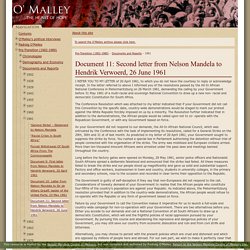
In the letter referred to above I informed you of the resolutions passed by the All-In African National Conference in Pietermaritzburg on 26 March 1961, demanding the calling by your Government before 31 May 1961 of a multi-racial and sovereign National Convention to draw up a new non- racial and democratic Constitution for South Africa. The Conference Resolution which was attached to my letter indicated that if your Government did not call this Convention by the specific date, country-wide demonstrations would be staged to mark our protest against the White Republic forcibly imposed on us by a minority. The Resolution further indicated that in addition to the demonstrations, the African people would be called upon not to co- operate with the Republican Government, or with any Government based on force.
Hqdefault. Nelson Mandela dies at 95. Freedom fighter, prisoner, moral compass and South Africa's symbol of the struggle against racial oppression.
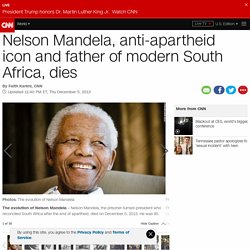
That was Nelson Mandela, who emerged from prison after 27 years to lead his country out of decades of apartheid. His message of reconciliation, not vengeance, inspired the world after he negotiated a peaceful end to segregation and urged forgiveness for the white government that imprisoned him. "As I walked out the door toward the gate that would lead to my freedom, I knew if I didn't leave my bitterness and hatred behind, I'd still be in prison," Mandela said after he was freed in 1990. Mandela, a former president, battled health issues in recent years, including a recurring lung infection that led to numerous hospitalizations. Despite rare public appearances, he held a special place in the consciousness of the nation and the world.
"Our nation has lost its greatest son. His U.S. counterpart, Barack Obama, echoed the same sentiment. A hero to blacks and whites A nation on edge. Nelson Mandela. What did Nelson Mandela mean to you?
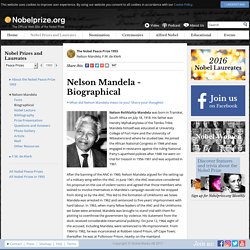
Share your thoughts! Nelson Rolihlahla Mandela was born in Transkei, South Africa on July 18, 1918. His father was Hendry Mphakanyiswa of the Tembu Tribe. Mandela himself was educated at University College of Fort Hare and the University of Witwatersrand where he studied law. He joined the African National Congress in 1944 and was engaged in resistance against the ruling National Party's apartheid policies after 1948.